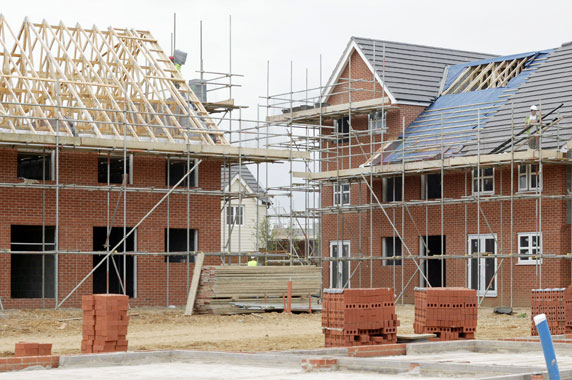Making better use of local house builders offers the best solution to tackling planning objections from communities not wanting new homes, says the Federation of Master Builders (FMB) in response to the speech on housing from the Secretary of State for DLUHC, Michael Gove MP.
Brian Berry, Chief Executive of the FMB said Mr Gove has made clear he wants to see more beautiful homes that overcome the worries local communities may have on developments.
“What better way to address this than to use local house builders, that deliver high quality, small sites in the local style?” he continued. “If the nation’s small house builders can be grown to the levels of delivery, they once enjoyed a few decades ago, small high-quality sites can become the norm across the UK. We can return to organic, sustainable housing growth, rather than relying on large scale, cookie cutter housing.
“It’s positive to see that local authorities will be held to account for not delivering on housing and that they will be made to allocate land to small builders. However, we’ll judge land allocation of small sites on the results, as previous efforts have failed. It’s also positive to see that local authorities are being pushed to deliver on local plans. A lack of a local plan is particularly difficult for smaller house builders, who have named land availability one of the biggest barriers to new delivering new homes. However, changes made to stop local authorities allocating greenfield land for development to meet housing needs will result in less housing, particularly in rural areas which are the heartlands of smaller house builders.
“Overall Gove’s announcement is a bit of a mixed bag. While there are some positive overtures, there isn’t not enough here to turn around the ailing housing market, particularly for smaller house builders. The planning system needs a significant overhaul that helps to boost smaller sites that deliver sustainable organic growth. But at the core of this, we need well-funded and staffed planning teams that can help SMEs through the planning system.”

The key change announced is the downgrading of the ‘requirement’ for local authorities to objectively assess their housing need using a Standard Method (that produces a realistic figure for their actual housing need) to ‘advisory’.
This means it is no longer a requirement of the planning system for them to be planning for the number of homes the local community needs.
Gove originally announced the proposals in December 2022. More than 60 Local Authorities have now withdrawn or paused their production of local plans.
Confirmation of the changes will give further license to local authorities to withdraw their plans and deliver fewer new homes.
The home building industry has been warning for some time that the Government’s proposed approach to home building could lead to a sharp fall in supply.
Research conducted by consultancy Lichfields earlier this year predicted that the proposed changes to the NPPF that were confirmed today could cause a drop of 77,000 homes a year.
The latest Housing Pipeline report released this week shows that the number of planning permissions being granted for new homes has continued to decline in the third quarter of the year – falling to another record low.
Neil Jefferson, Managing Director at HBF said: “The removal of housing targets for local authorities, one of the key principles of the planning system, will be extremely damaging for the delivery of new homes.
Jefferson added: “Already we are seeing house building and planning permission levels tumble as a direct result of the Government’s approach and further falls are now inevitable.
“While the announcement today does include some modest improvements to the planning process, most are simply threats that will not make a difference in the short term.
Jefferson concludes: “Amidst a deepening housing crisis, putting party politics and electioneering above the interests of those in need of a decent home will have devastating long-term consequences for the economy and society.”
Kate Henderson, Chief Executive of the National Housing Federation, says: “Millions of people in communities across England are affected by the housing emergency, and today’s changes risk further undermining the country’s ability to build the homes we desperately need.
“These changes, which effectively relax local housing targets, will result in fewer homes; and measures to get councils building and approving applications, whilst positive, won't be enough to offset this risk. We're concerned measures to protect the greenbelt at any cost will prevent otherwise sustainable developments, close to existing communities, from being built. Some greenbelt land is of low quality and limited value and includes car parks and petrol stations. Given the chronic shortage of homes in England, it makes sense to use this land to deliver new homes, whilst protecting the parts of the green belt that are more valuable to our environment.
“Our research shows that, without urgent action, by the end of the next parliament nearly five million households will be living in unaffordable homes and 150,000 children will be facing homelessness. To solve the housing crisis, this short-term, piecemeal approach to housing policy and planning must end. As we head towards the election, we need all political parties to commit to a properly funded, nationally coordinated long-term housing plan that aims to transform the health, economic security, and life chances of millions.”
Cllr Darren Rodwell, housing spokesperson for the Local Government Association, said: “People want their local area to have high-quality affordable homes built in the right places, supported by the right infrastructure, and councils stand ready to government tackle local housing challenges.
“This is best achieved through a local planning system with public participation at its heart. So we are pleased government has confirmed that housing targets will become an advisory starting point which will take into account local circumstances.
"The reality is that planning is not a barrier to house building. Nine in 10 planning applications are approved by councils despite significant resourcing and capacity issues across the country.
“In order to help increase the speed of local plan-making and housing delivery, we urge the Government to bring forward consultations on a revised National Planning Policy Framework and National Development Management Policies which will form the backbone of a new style of plan-making due in Autumn 2024.”




















